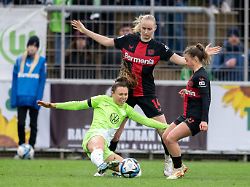Should men whistle again?
The Bundesliga is worried about the “alarming” situation of female referees
February 6, 2024, 8:49 p.m
The clubs in the women’s Bundesliga complain about the lack of professionalism among female referees – and are considering a radical step. But those responsible have been trying to change the circumstances for years. In the end it depends on the association.
Osman Cankaya has had enough. The situation in the women’s Bundesliga is “alarming” and “no longer acceptable,” complained the sporting director of promoted team 1. FC Nürnberg and accused the German Football Association (DFB) of “qualitative deficiencies and structural deficits” in the area of female referees. The angry attack on equality by someone who has died yesterday? Not at all!
In his cry for help, Cankaya openly named a problem that has been troubling those responsible at all clubs for months. His proposed solution is as radical as it can win a majority: men should get back on the whistle! Not exclusively, but in addition to the women’s teams, who repeatedly made serious mistakes. The topic is likely to come up at the managers’ regular half-yearly meeting next week.
“Why are we not able to open the gates for male referees?” asked department head Bianca Rech from champions Bayern Munich in “Kicker” at the beginning of the year. Ralf Kellermann, sporting director at cup winners VfL Wolfsburg, assisted: “We are the only top nation in Europe that affords not to fill the referee teams with men.”
“Parallel to a 40-hour week”
This has nothing to do with misogyny, it’s all about professionalization for everyone involved. This has increased rapidly among female players since the major men’s clubs across Europe have been investing in their women’s teams. When it comes to female referees, however, the situation is often still amateurish.
“Quality has to decide,” said national coach Horst Hrubesch. “It doesn’t matter whether I put a man or a woman there.” Like in any other work area. However, the quality suffers when referees lead games “in parallel to what is often a 40-hour week,” as Christine Baitinger admitted on ARD in the fall. Baitinger was once a referee at a world-class level and is now the sports director of referees at the DFB.
Given these circumstances, it is “not surprising,” said VfL boss Kellermann, that the gap between players and referees “has grown larger.” Especially since the best female referees are often used by men and there is no VAR for women for cost reasons.
The “Tanker” DFB needs time
What frustrates the clubs is the slowness of the “tanker” DFB. “We would like the DFB to prioritize this issue more,” said Rech. It’s not about letting a man whistle in the league’s top game, reassured Kellermann. Rather, the teams could be filled up “until I have enough quality across the board to be enough.” Other leagues took this approach, only Germany had the “luxury” of doing without the professionals. “I made the suggestion to the DFB years ago,” said Kellermann, “and it was strictly rejected by those responsible at the time.”
When opening up to men, “we must not neglect the promotion of young female referees,” warned Viola Odebrecht (RB Leipzig) when asked. The Nuremberg Cankaya therefore offered the DFB support “in the development of a sustainable and optimized training concept”. However, this can “at best only provide a medium-term remedy” to the “league-wide problem” that is affecting the attractiveness.
There doesn’t seem to be a quick solution in sight. Head referee Baitinger wants to increase the financial “freedom” of her team in the future. Overall, however, “we are very well positioned,” she emphasized: “We have top female referees, including young ones.”
